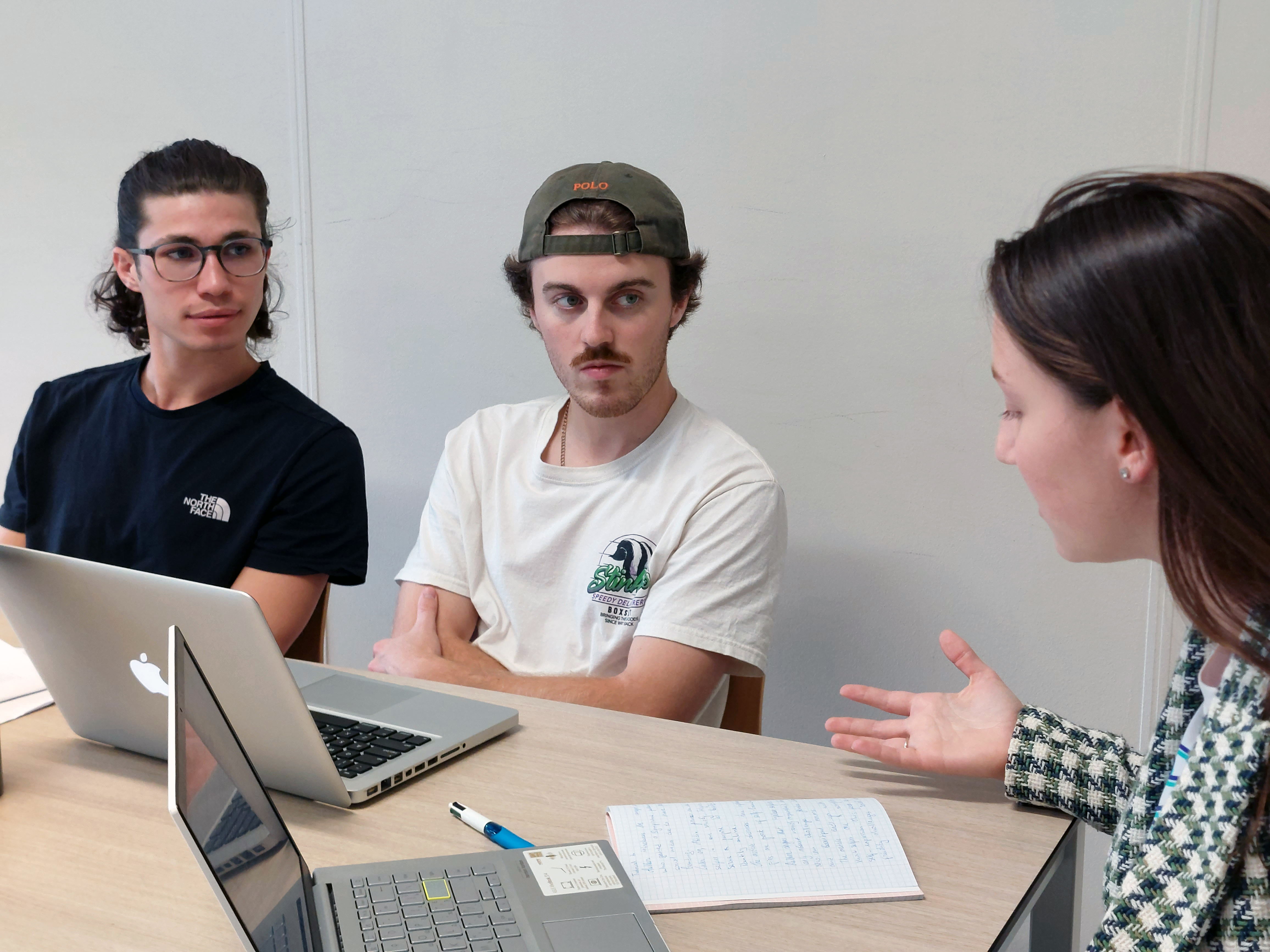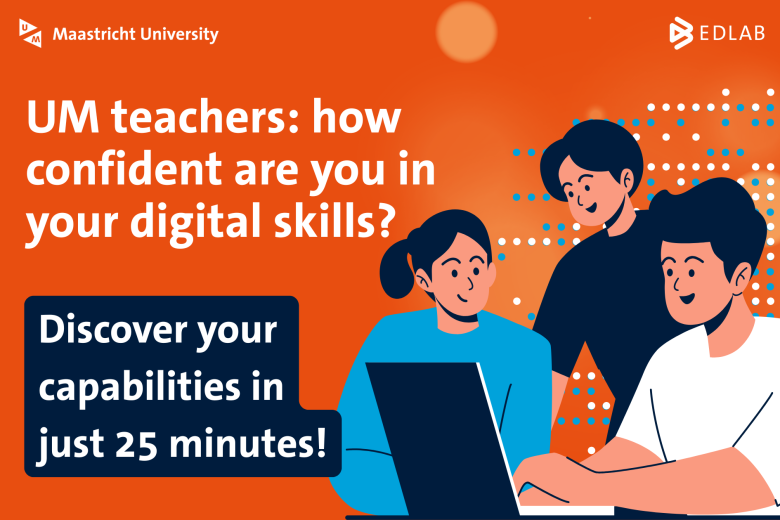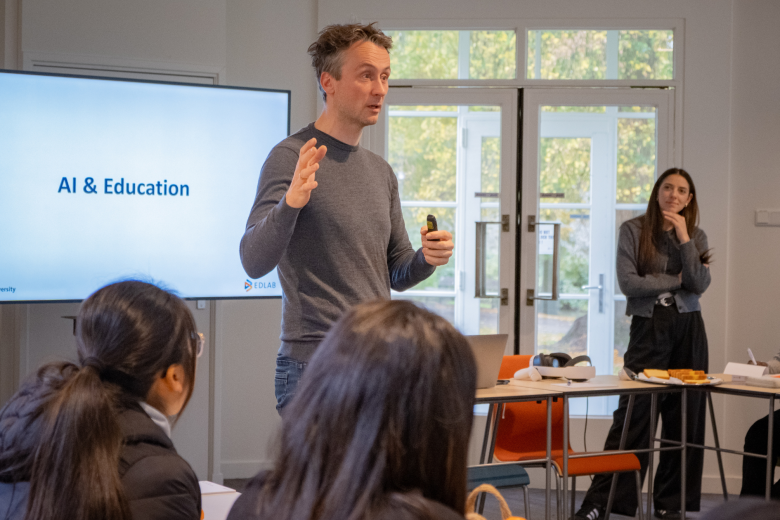Students exploring research together: collaborative learning in a methods course
Alexandra Supper challenges the common conception that skills training at Maastricht University operates separately from Problem-Based Learning (PBL) principles. She argues that a research methods skills course, such as the Bachelor's course "Doing Ethnography", can effectively embrace PBL principles, particularly collaborative learning. Alexandra illustrates how this course encourages students to collaborate while making individual research progress through shared methodological reflection.
“This is a skills training, so we don’t really do problem-based learning”. I have lost count of the number of times that I’ve heard variations of this statement, from students and colleague-teachers alike. In practice, however, I have yet to hear of a skills training at Maastricht University that does not incorporate the core CCCS principles of Problem-Based Learning (PBL): Constructive, Contextual, Collaborative and Self-directed.
With this short piece, I want to make the case that a skills-training course dedicated to teaching research methods can actually be the perfect setting to set these principles in action. I will zoom in on one of these core principles, collaborative learning, in the context of a second-year skills training course that I have co-designed and now coordinate: Doing Ethnography in the BA Arts and Culture.
This skills course facilitates a collaborative learning process by creating space for shared methodological reflection. In doing so, it stimulates students to learn in a collaborative manner while also achieving and demonstrating individual research progress.
Towards a shared frame of reference
For most students who take this course, Doing Ethnography forms their first substantial encounter with ethnographic research: a qualitative empirical research method that aims for a detailed understanding of how people give meaning to and make sense of their world. While the skills training is designed to take a hands-on approach – it is, after all, called Doing Ethnography, not Reading About Ethnography – students first have to establish an understanding of what ethnographic research is, what principles and assumptions it is based upon, and what it can (and cannot) be used for.
To gain a shared frame of reference, students attend an introductory lecture and read a short textbook introduction. Next, they take part in a series of collaborative assignments that prepare the ground for their own research practice. Some of these assignments are very specific to ethnographic methods, for instance when we practice the skill of participant observation in the context of a game of Uno (see my recent publication).
However, the two assignments I will present here could also be applied to teaching any other research method, as they revolve around collaborative methodological reflection.
Critical reading and shared reflection
The first example involves an exercise in critical reading and shared reflection. During the first tutorial, we provide students with a few short snippets of academic texts. All excerpts revolve around practices of using the internet and mobile phones, based on various methodological approaches. In small groups, students discuss which of these texts seem to come from the research tradition that our skills training focuses on, ethnography. This allows students to recognise some of the abstract methodological principles they have learned, and to collectively reflect on what these principles actually mean. Some excerpts are unambiguously not ethnographic (e.g., because they are based on quantitative research), while other examples, such as the following quote, are more difficult to place:
In a small village in Kent a window cleaner is coming to the end of his round, completing the final cluster of houses along a winding country road as the night draws in. As he stands level with the first storey windows of a house, he reaches into his back pocket with his right hand and takes out a mobile phone, while his left grips the ladder. After a cursory glance at the time displayed on screen, he turns his phone around so that it faces outward. He then transfers it into the clutch of his supporting left hand with the phone’s screen still facing away. The reason for this peculiar action becomes apparent as the light display illuminates the panes, enabling him to wipe over the windows with his free right hand to ensure a smear-free finish in the diminishing daylight. (Tutt & Hindmarsh, 2009)
This is an opening anecdote of an academic text based on ethnographic research, but the quote ends before the analysis starts. Some students identify this snippet as being ethnographic because it appears to be based on an approach of participant observation. Others argue that this is not an ethnographic text because it resembles journalistic writing and lacks analytical rigour. Based on just the short snippet that they have seen, both of these conclusions are equally valid. What matters most in the learning process is the collective effort of thinking through the principles of this type of research, not getting to a specific yes/no answer.
Creating common ground for individual research
In parallel to these first encounters with ethnographic research, we ask students to come up with a research problem that their tutorial group can work on for the duration of the skills training. Eventually, students will conduct their research individually, but they will do so in a collaborative framework. After generating and collecting suggestions for topics, students review and discuss together why particular subjects may (or may not) work in the context of the skills training. They need to consider practical constraints such as field access and timing, as well as the fit between the research they would like to do and the constraints of ethnographic methodological approaches. This reflection process helps students develop the capacity to identify a good fit between research questions and methods and a ‘doable’ research problem.
An important part of developing ethnographic research skills is to learn a new way of looking at the world and to pay close attention to things that, on the surface, might appear quite mundane. While the possibilities for doing extensive research in the context of a skills-training course may be limited, it is possible to experience key aspects of conducting their own ethnographic research.
Focusing on the challenge of aligning research questions with appropriate methods, we often end up with broad research themes. They may not always lead to groundbreaking new insights, but they leave room for students to develop their own individual research interests in relation to the broader theme. For instance, a group might choose to investigate practices of mobile phone use in different social situations, giving individual students the chance to conduct research in diverse settings such as a lecture hall, a city park, a homeless shelter, or the shared kitchen of a student house.

Individually conducting and collectively reflecting on research
In both of these assignments, the emphasis is on shared reflection on the research process. This emphasis also carries through into the second half of the course, when students conduct research, share their work-in-progress and write a research report. Along the way, we ask students to share the 'raw materials' of their research, such as field notes taken during their observations and transcripts of interviews. The shared framework of a joint research problem helps keep students engaged with their peers' research, makes it easier for them to give relevant feedback, and invites a discussion of findings alongside procedural reflections. This way, both individually and as a group, students are encouraged to pay attention to what worked well and where there is room for improvement.
Challenges with assessment
To ensure students go through all steps of the research process and demonstrate individual progress, the skills training deliberately stopped short of asking students to conduct a fully collaborative research project. To pass the course, each student writes a research report based on at least one qualitative interview they conducted individually and notes from their own observations. The report may also refer to examples from the work of classmates. In practice, however, it is rare for students to include references to the work of their colleagues. Here, the potential of collaborating in a team and the need to perform well individually seem to be at odds with each other – at least in the context of the time constraints imposed by the eight-week structure of the course. The course design, with its clearly defined criteria, encourages students to take a ‘check-box’ approach in terms of fulfilling the assessment requirement rather than take extra chances that have the potential to lead to more insightful results (e.g. by drawing on additional research by others), but which also take additional time and increase complexity.
By sharing these reflections, I want to show how research methods or skills training courses provide a context that can be highly conducive to collaborative learning, even if the assessment takes an individual format. Throughout our skills training, ‘collaboration’ is implemented in a way that invites students to develop a shared vocabulary and toolkit for working with a new research method and to provide space to share and reflect upon their experiences along the way. On the other hand, the role of assessment remains a challenge, as a tick-box approach to fulfilling assessment criteria may not lead to the most well-rounded learning processes.
I hope these reflections spark ideas for ‘collaborative learning’ about other methodologically oriented skills-training courses – and if anyone has questions or ideas, I look forward to hearing from you and engaging in shared methodological reflection!
By Alexandra Supper, Assistant Professor, Department of Society Studies, Faculty of Arts and Social Sciences, Maastricht University.
This article is a publication of edUMinded, the Maastricht University online magazine on Teaching & Learning.
Interested in more Teaching & Learning insights?
Also read
-
Teacher Information Points at UM
UM faculties now host Teacher Information Points (TIPs) that offer local, “just-in-time” and on-demand support for teaching staff. The aim is simple: to provide help that is closely connected to day-to-day teaching practice.
-
As a teacher, how confident are you in your digital skills? Discover your capabilities in just 25 minutes
Maastricht University invites all teaching staff to take part in the Jisc Discovery Tool pilot to explore your digital strengths.
-
UWC Maastricht students get a taste of education innovation at EDLAB
On 21 October 2025, EDLAB hosted students from United World College Maastricht for the second year in a row, as part of their Youth Social Entrepreneurship programme.